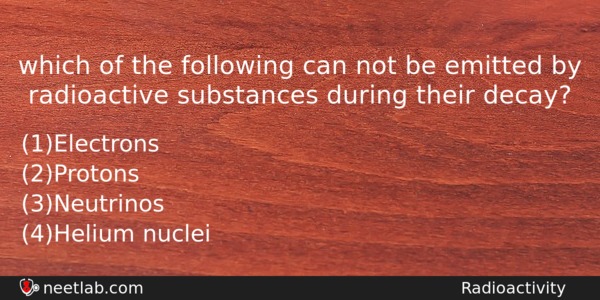| ⇦ | 
| ⇨ |
which of the following can not be emitted by radioactive substances during their decay?
Options
(a) Electrons
(b) Protons
(c) Neutrinos
(d) Helium nuclei
Correct Answer:
Protons
Explanation:
No explanation available. Be the first to write the explanation for this question by commenting below.
Related Questions: - Dimensions [ML⁻¹T⁻¹] are related with
- The condition under which a microwave oven heats up a food item containing
- In the Davisson and Germer experiment, the velocity of electrons emitted from the
- A bar magnet having a magnetic moment of 2 x 10⁴JT⁻¹ is free to rotate in a horizontal
- To observed diffraction, the size of the obstacle
Topics: Radioactivity
(83)
Subject: Physics
(2479)
Important MCQs Based on Medical Entrance Examinations To Improve Your NEET Score
- Dimensions [ML⁻¹T⁻¹] are related with
- The condition under which a microwave oven heats up a food item containing
- In the Davisson and Germer experiment, the velocity of electrons emitted from the
- A bar magnet having a magnetic moment of 2 x 10⁴JT⁻¹ is free to rotate in a horizontal
- To observed diffraction, the size of the obstacle
Topics: Radioactivity (83)
Subject: Physics (2479)
Important MCQs Based on Medical Entrance Examinations To Improve Your NEET Score
18000+ students are using NEETLab to improve their score. What about you?
Solve Previous Year MCQs, Mock Tests, Topicwise Practice Tests, Identify Weak Topics, Formula Flash cards and much more is available in NEETLab Android App to improve your NEET score.
Share this page with your friends

Leave a Reply